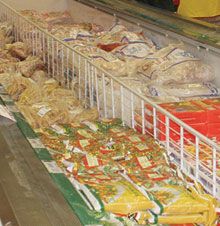Power cuts plunge business into turmoil
MOGOMOTSI MOLOI
Correspondent
| Friday January 25, 2008 00:00

Since January 16 some parts of the country has experienced unexpected power blackouts. This is because Botswana's major power supplier, Eskom, of South Africa, has decided to cut the outside supply to meet local demand.
This latest development has not gone down well with the business community here who fear that the problem will impact negatively on their businesses. Pay Less Supermarket manager at Madirelo mall Edwin Motlhabane said though the complex has a backup generator, repeated outages would result in extra costs. They have to buy fuel to run the backup system. 'We used to have a generator connected to tills only but we have since connected it to fridges, slicing machines, ovens and big cold rooms,' he said. But he pointed out that these big appliances require more electricity.
He lamented that fuel is very expensive these days and more money would be lost. He asserted that the outage is an inconvenience to the customers. Motlhabane said his business is not going to meet the demand because they will have to reduce the supply of perishables. Balaji Kuppan, of Spar Supermarket in the Gaborone main mall, was candid, saying 'we can't do anything without electricity'.
'If there is no power we lose everything,' he said. Unlike at Pay Less, main mall Spar does not have a generator and Kuppan fears the worst as they stand to incur huge losses during such power interruptions. He challenged the government to speed up plans to have a small plant that produces electricity, while long-term projects are under way.
Outlets like KFC, Chicken Licken, butcheries and bakeries, where electricity is heavily used, will be among the hardest hit. A manager at one of the KFC outlets, who preferred not to be named, is worried that they have lost much business since the problem started.
'Right now it is lunch time but there is no power and we are not making any money,' said a worried KFC manager yesterday, adding that they end up capturing data manually, and paying employees unnecessary overtime. KFC foods are prepared upon request. He said last week they had to throw away 500 rotten pieces of chicken due to power cuts. He blamed government for not being proactive in addressing such issues. The fuming KFC manager said it is a disgrace for Botswana to depend so much on other countries for electricity.
Botswana Confederation of Commerce Industry and Manpower (BOCCIM) Public Relations Officer (PRO) Tebogo Rapitsenyane is concerned that if the crisis persists, some small businesses will collapse. 'People may end up losing jobs. Think of salons, motor industry, hospitals, educational institutions or any business where electricity is critical. This is extremely worrisome,' said Rapitsenyane.
He said though BOCCIM was earlier informed of the situation, it is not healthy for the business environment. He added that even the economy might be affected, as there will be no income generated. 'Hopefully Botswana Power Corporation (BPC) would act fast in addressing the problem,' he hoped.
BPC has issued a statement saying blackouts are currently being scheduled and rotated in an attempt to spread the impacts of the shortages. Importing the major part of electricity requirements from South Africa and the region renders Botswana vulnerable to this regional situation.
The BPC Public Relations division said the new Eskom power supply contract has been implemented, reducing supplies from Eskom to 350 MW this year (down from 410 MW last year). Further step-downs are scheduled for the annual contract anniversary date each year until 2010. BPC says it is doing everything in its power to minimize inconveniences to its customers.
According to the government Daily News, the permanent secretary in the Ministry of Minerals, Energy and Water Resources Dr Akolang Tombale acknowledges that the power shortage faced by Eskom is a serious concern to Botswana. He however assured that plans to deal with the situation are under way. He said the ministry is also working on importing power from other neighbouring countries. Power used in Ghanzi is imported from Namibia, for instance.
